In a city battling waste and neglect, seven women in Butwal are rewriting the rules of sanitation. Their success exposes both the strength of grassroots leadership and the absence of a national strategy.
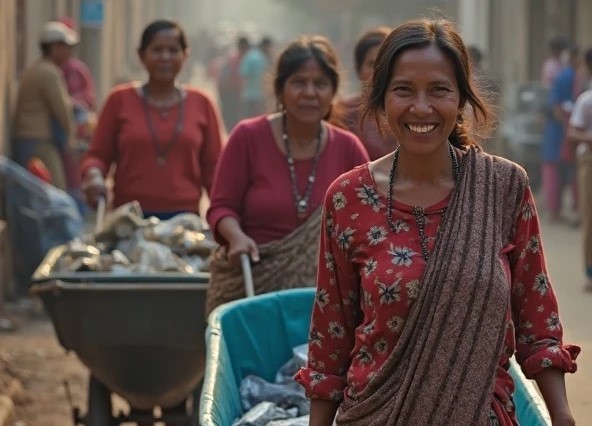
August 04, 2025
Butwal, Nepal
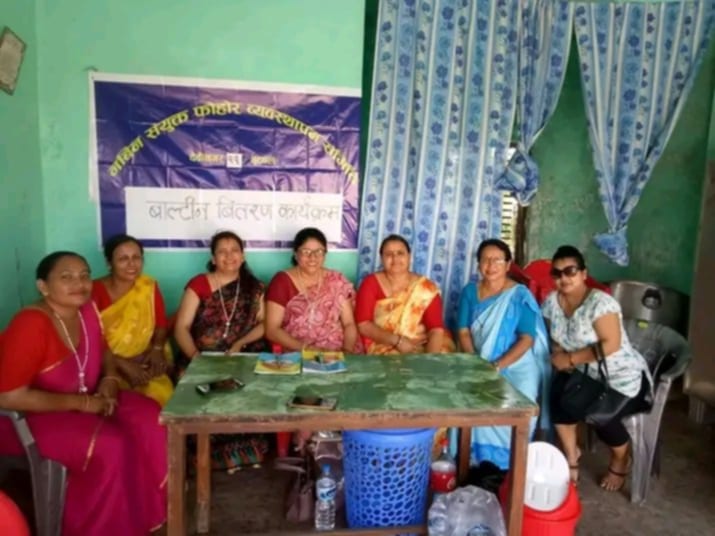
Seven women from the Nabin Samyukta Waste Management Committee, Devinagar-11, Butwal, actively engaging in a dustbin distribution program. Credits: Shova Poudel
In the heart of Butwal, a city striving for sustainable waste management, a group of seven women has been quietly transforming their community's approach to sanitation for over a decade. Established in 2012 AD (2069 BS) in Ward No. 11, Devinagar, the Nabin Samyukta Fohor Maila Byabasthapan Samiti (New Collective Waste Management Committee) has consistently served over 400 households and five institutions across four local communities (toles).
Operating with limited resources, the Committee collects waste twice a week, transporting approximately two tons of waste monthly to the Majhuwa dumping site. At a time when urban waste continues to overwhelm Nepal’s municipalities, such grassroots efforts show how change can begin at the local level—even with limited resources.
Yet the persistence of these isolated models raises a bigger question: What would it take for Nepal to move from scattered efforts to a unified national response?
The Committee’s inception was grounded in necessity. “People used to throw their waste by the roadside, without any care,” shared Shova Poudel, Deputy Chair of the Committee. “Plastics were scattered by dogs or blown away by the wind. So we started this initiative.”
What began out of necessity has evolved into a model of community-led resilience, facilitating the transportation of waste to the dumping site. Initially, the team relied on hand carts for collection. Eventually, the women secured a tractor, easing the burden of transportation. Currently, Poudel handles all responsibilities in the absence of Chair Anjala Shakya, who is in Kathmandu.
After interviewing Deputy Chair Shova Poudel, further information was gathered from other active members of the Samiti. Among the seven women involved, Purnakala Aacharya, one of the active members, shared:
“We started on our own 14 years ago from Nabin Tole. Initially, it was challenging to convey our work and the purpose of this initiative to the public. However, with time, they came around, and it became easier with their coordination. We initially used hand carts to collect waste ourselves, but later we managed to acquire a tractor, which has made the work much easier. We are happy and very proud of what we have achieved.”
However, unlike more advanced facilities, the Committee operates without a permanent office. All operational records are maintained manually in three registers by Poudel. While the leadership is entirely female, three male workers assist with waste collection and disposal.
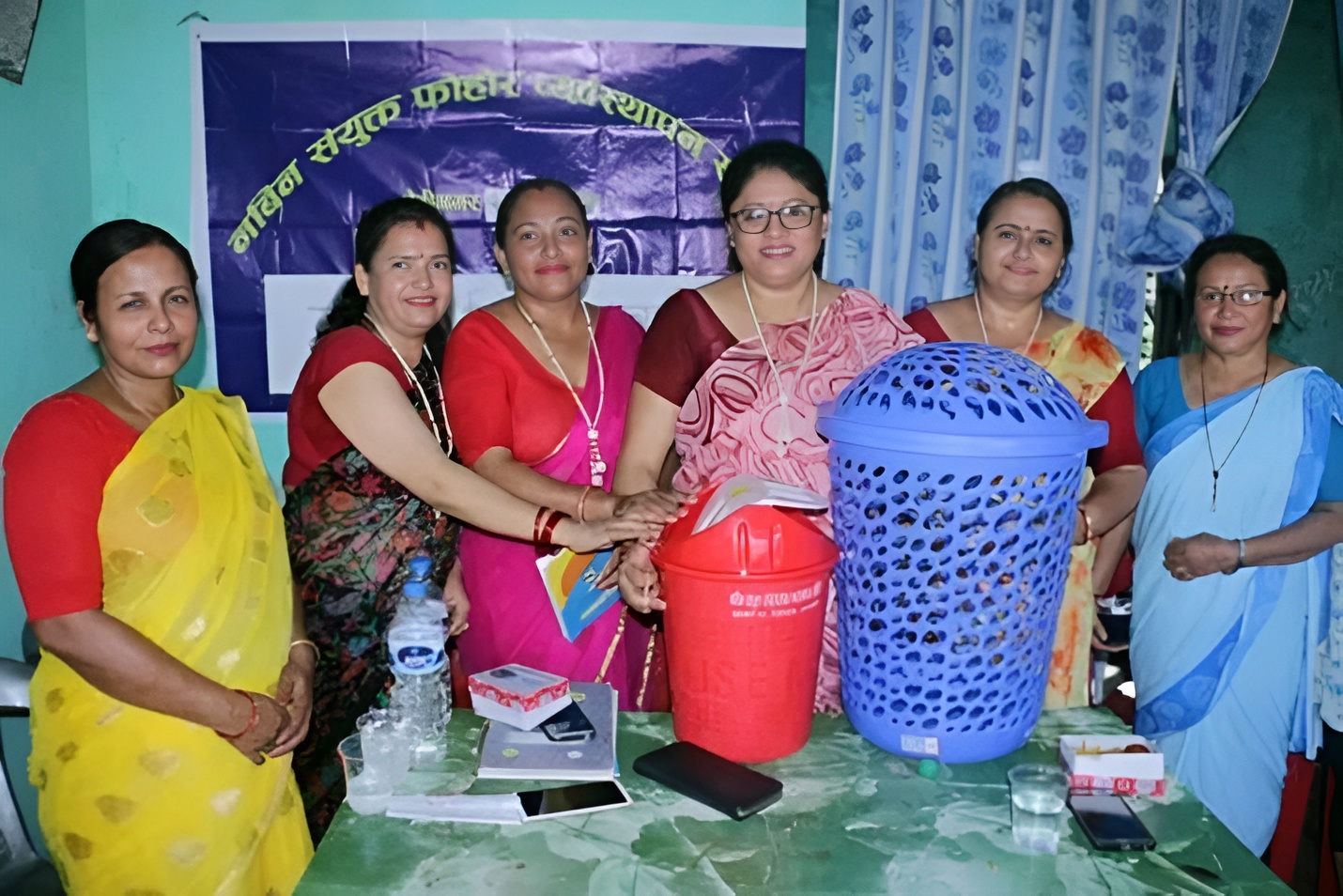
Six women from the Nabin Samyukta Waste Management Committee, Devinagar-11, Butwal, actively participating in a dustbin distribution program. Credits: Shova Poudel
The Committee does not recycle or process the collected material; all of it is dumped. Households are charged NRs. 75, and institutions NRs. 100—the lowest fee in all of Butwal. These minimal charges cover basic operations and regulatory payments, including 13% VAT and 10% of revenues to the Sub-Metropolitan City.
Despite receiving an initial grant of NRs. 100,000, the Committee has not submitted further proposals for support, resulting in ongoing financial strain.
Despite limited resources, the Committee has gained respect from the community. “Our lives have become so much easier, and the roads have been a lot cleaner since this Committee was established,” said a 43-year-old local resident (name not mentioned as per request). “We are happy with their work and thankful to them.”
However, Poudel recalls moments of difficulty. “Most of the time, people appreciate our work and treat us with respect. But sometimes, if our tractor is slightly delayed or we miss a day, I get threatening calls. Some say they will dump waste in front of my house.”
Nevertheless, the women persevere, take pride in their work, and in their ability to serve the community under tough conditions. They are yet to get the national government’s attention.
The Sub-Metropolitan does acknowledge its contribution. Thagishwor Pokhrel, Head of the Waste Management Department at Butwal Sub-Metropolitan City, affirmed, “They are doing their best. It is one of the most effective waste collection institutions in Devinagar.”
After the initial support, he adds, they have not been able to assist further, indicating the metropolis’s lingering interest in expanding the initiative.
Butwal’s women are not alone. There are many such examples of local efforts trying to make a difference. While many succeed, they also highlight a larger issue: Nepal’s waste management strategy remains fragmented.
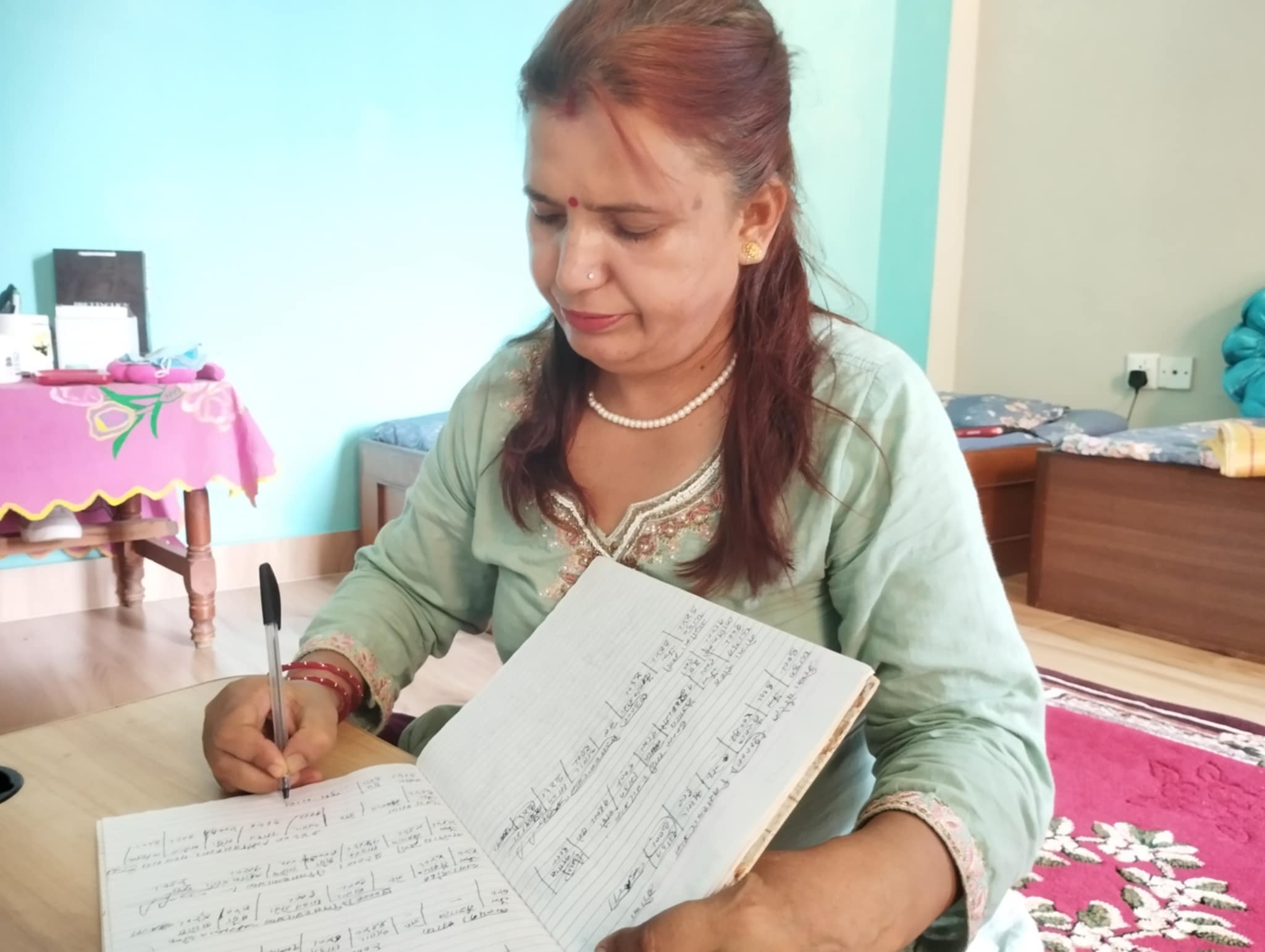
Shova Poudel, Sub-Chairperson of the Nabin Samyukta Waste Management Committee, Devinagar-11, Butwal, documenting the committee’s monthly activities at her home. Credits: Shova Poudel
Across the country, women are rising to meet this gap. But without a systemic investment and coordination, these efforts risk remaining isolated and overburdened.
Lalitpur: The Women Environment Preservation Committee (WEPCO), established in the 1990s, has been operating women-only recycling and energy-from-waste programs, also giving training and cooperative loans.
Dhobighat: Through its “Her Safety” program, Clean Up Nepal has introduced women’s safety committees inside Material Recovery Facilities (MRFs) to tackle gender-based violence, improve working conditions, and promote workers’ rights.
Rupandehi & nearby municipalities: Under the United Nations Development Programme (UNDP)’s Provincial and Local Governance Support Programme (PLGSP) in Tilottama, Sainamaina, Ghorahi, and Waling, over 1,300 individuals have been trained in vermicomposting, over 70% of whom are women. In Tilottama alone, 20 female workers are employed at a waste processing center.
Kathmandu: The Haleshi Kabaad Center, renovated under Creasion’s Project Prayaash in 2023, now features gender-sensitive infrastructure, including private lactation and changing rooms, addressing long-ignored needs of female workers in the waste management sector.
Other Female-Led Models: Organizations like Avni Ventures, Khalisisi, Doko Recyclers, Revive Upcycle Nepal, Baneshwor Mahila Batarawaniya Sewa, and Hatti Hatti are building gender-inclusive, eco-focused enterprises by training women in waste collection, upcycling, and green entrepreneurship in the Kathmandu Valley.
These diverse, mostly women-led solutions offer valuable insights. But their success stories also underscore a systemic failure: Nepal lacks a national framework that ties these efforts together, supports them equitably, and sustains them long-term.
From the narrow lanes of Butwal to the urban solutions in Kathmandu, women are not only participating in waste management—they are leading it. These grassroots initiatives offer powerful stories and lessons in reclaiming dignity, building local pride, and driving grassroots governance.
In a country where informal workers often remain invisible, these women’s stories show that inclusive, sustainable change does not always start with policy, but often with people.
But Nepal’s waste sector needs more than scattered successes. It needs an integrated national approach—one that centers sustainability, gender equity, and local ownership. Until then, women like Poudel will continue to lead—quietly, effectively, and often invisibly.
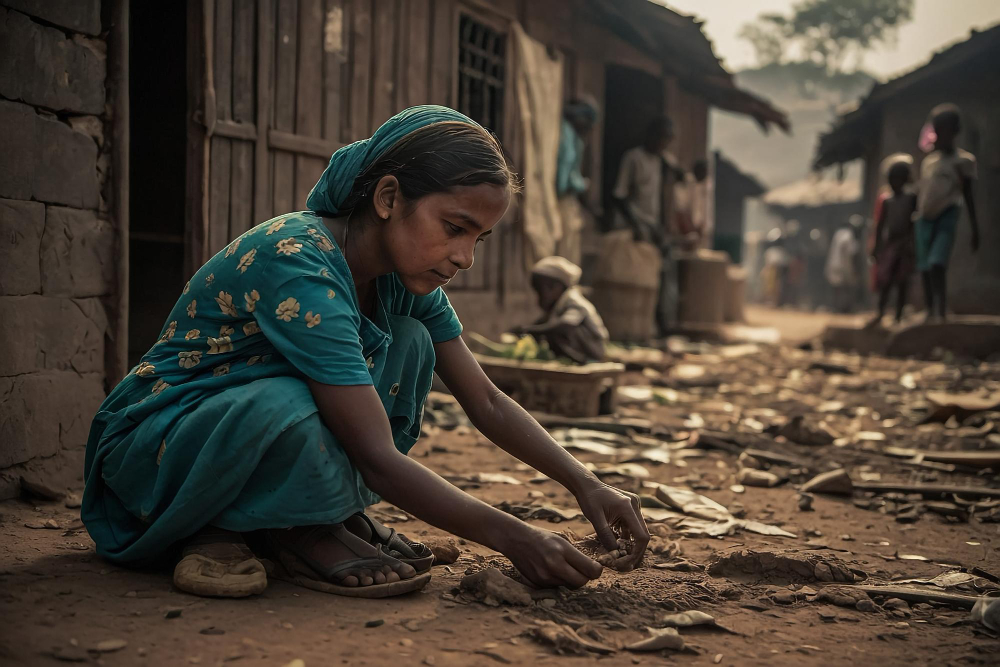
By sharing valuable information and sparking inspiration, we aim to foster growth, innovation and brighter opportunities for future generations.
Contact us